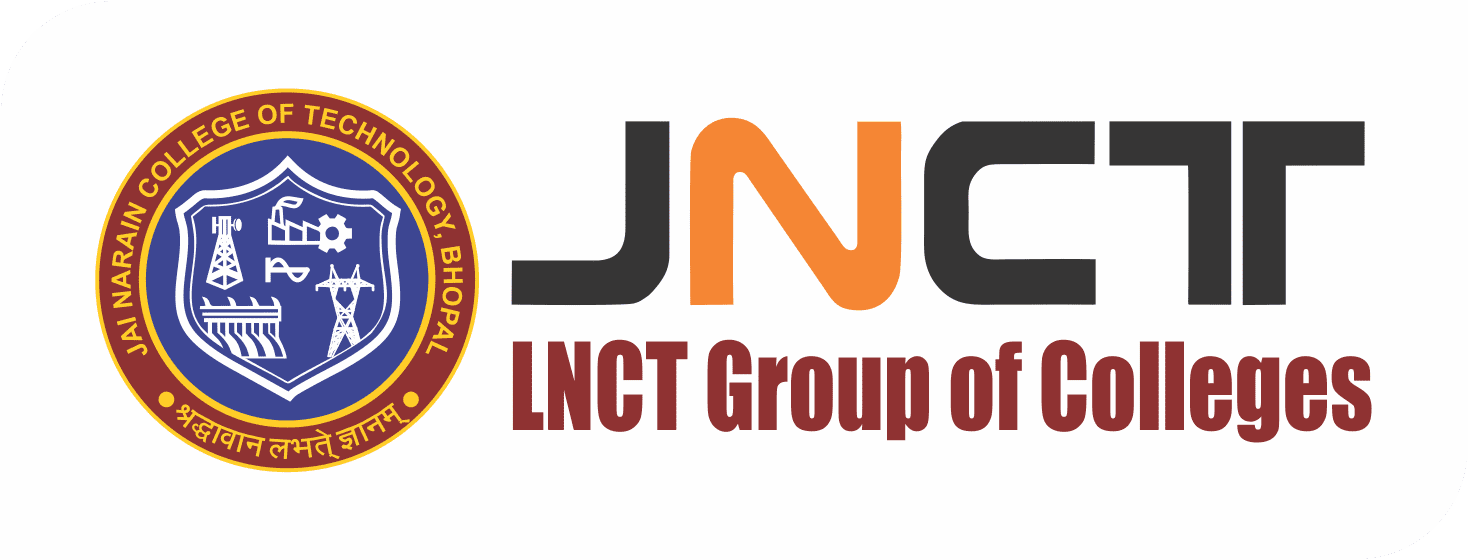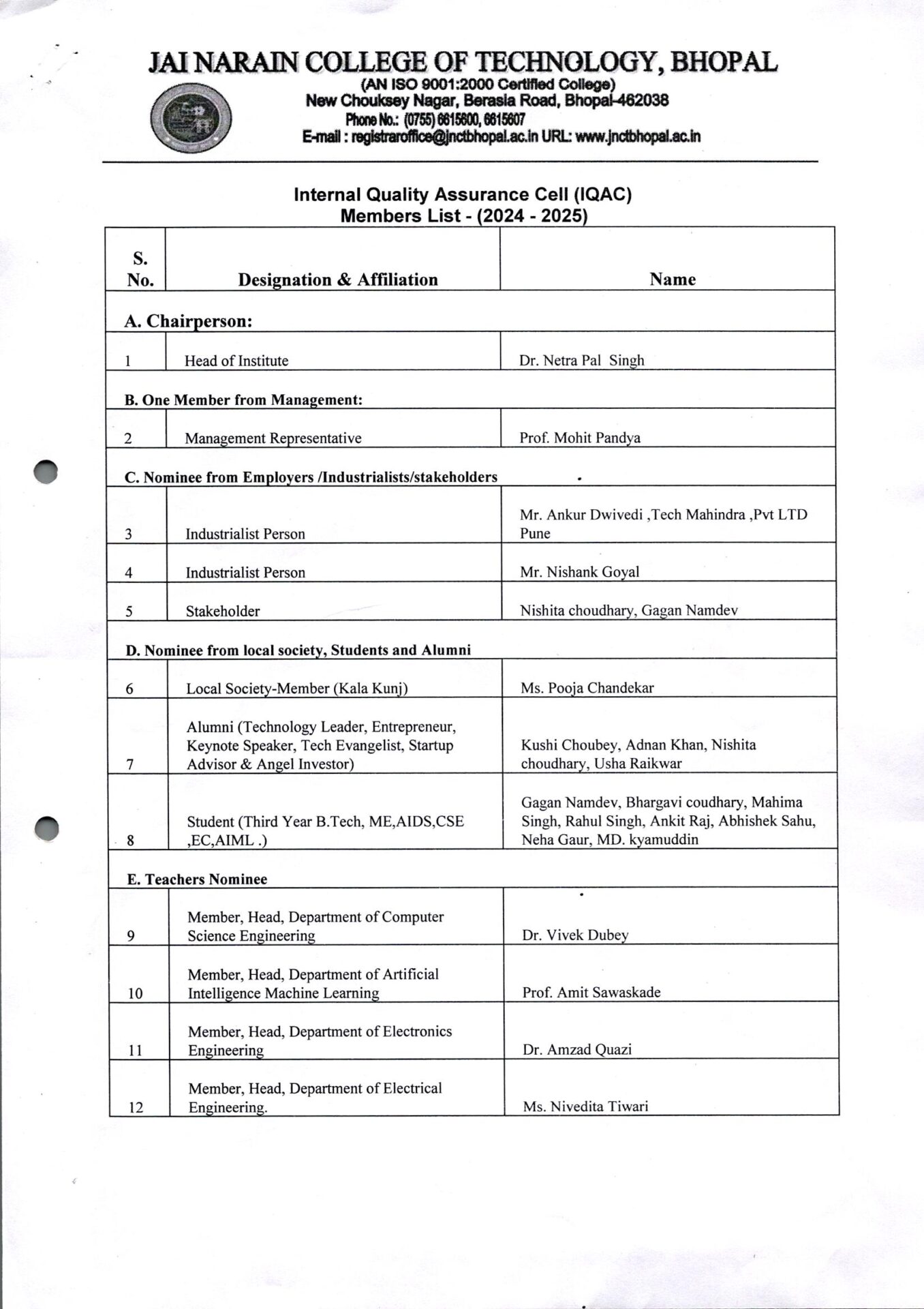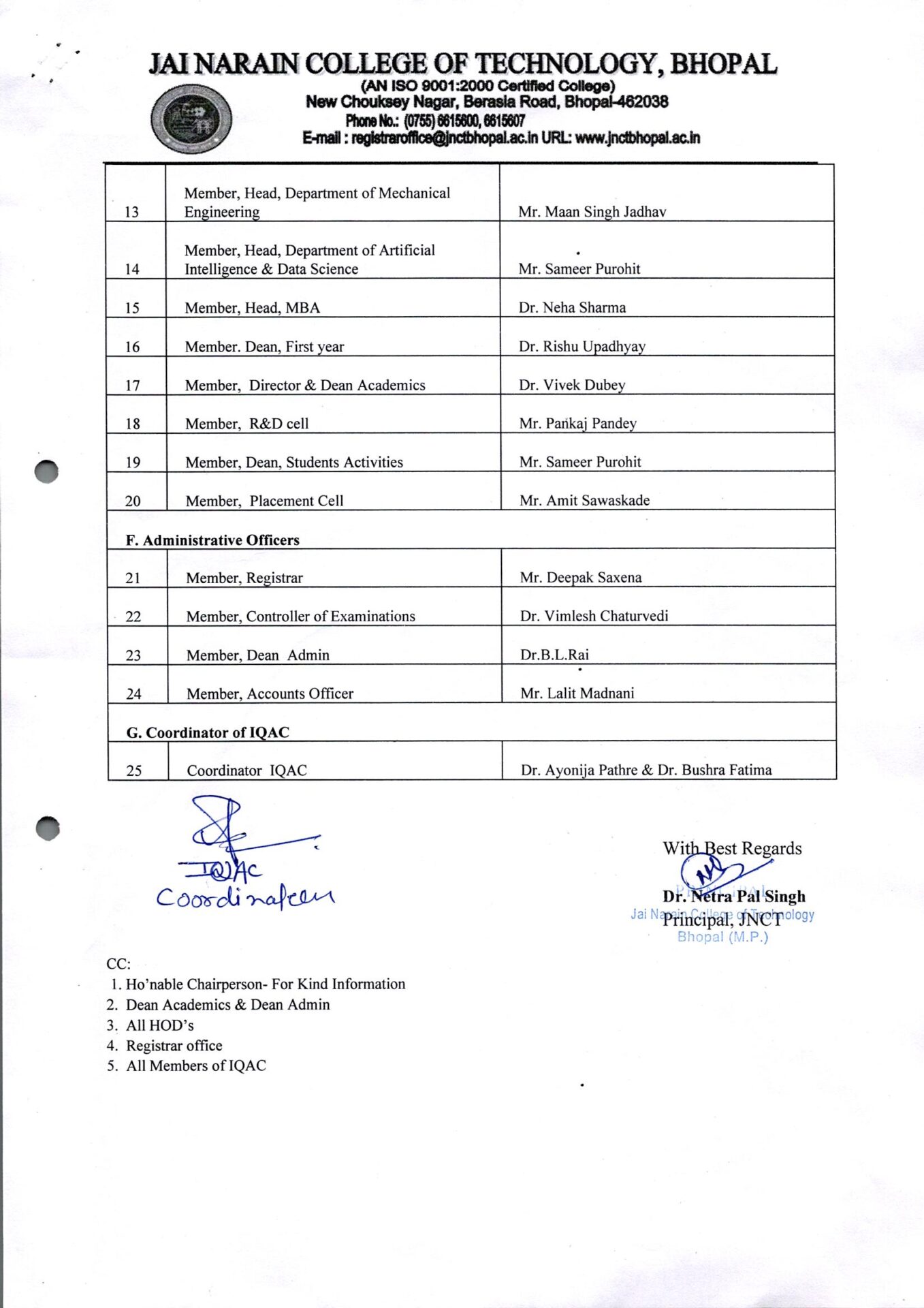IQAC
- Home
- »
- IQAC
IQAC
- About IQAC
- Vision and Mission
- IQAC Committee
- Minutes of Meeting (MoM)
- IQAC Composition
About IQAC : The Internal Quality Assurance Cell (IQAC) of our college was established on 2nd July 2024 with the objective of enhancing and sustaining the quality of education and overall institutional performance. The IQAC functions as a central body that ensures the continuous improvement of teaching, learning processes, infrastructure, and student facilities. It acts as a bridge between students, faculty, and management, fostering coordination and collaboration to maintain and improve academic and administrative quality standards.
The key responsibilities of the IQAC include:
● Monitoring and evaluating the quality of teaching, learning, and research activities.
● Assessing whether the infrastructure and facilities provided to students are adequate and effective.
● Promoting a culture of continuous improvement and innovation in all institutional operations.
● Encouraging and incorporating constructive feedback from stakeholders for planning and implementing quality enhancement initiatives.
● Being open and receptive to new ideas aimed at upgrading the standards of higher education and research.
The IQAC plays a vital role in developing strategies and practices that contribute to the institution’s vision of excellence in technical education, while aligning with the National Quality Framework and expectations of accrediting agencies.
Vision : To establish the institute as a center of excellence in technical education by ensuring quality as the defining element of higher education through a combination of internal and external quality evaluation, promotion, and sustenance initiatives. The IQAC envisions nurturing students with an intensive work culture, fostering entrepreneurship, innovation, and leadership to meet global standards.
IQAC Mission Statement:
To establish the institute as a center of excellence by promoting state-of-the-art technical education.
1. To cultivate moral values and social responsibility through industry consultation and societal engagement.
2. To stimulate a quality-driven academic environment that enhances teaching, learning, and research.
3. To encourage self-evaluation, accountability, autonomy, and innovation among all stakeholders.
4. To undertake quality-related research studies, consultancy, and training programs.
5. To integrate the latest technological developments in information and
communication into academic and administrative practices.
IQAC Objectives:
1. To promote self-evaluation, accountability, and innovation in teaching, learning, and research.
2. To nurture a strong quality culture across academic and administrative activities.
3. To deliver quality technical education ensuring academic excellence and professional growth.
4. To encourage innovation, entrepreneurship, and leadership among students.
5. To enhance industry collaboration for research, training, and consultancy.
6. To prepare students as future-ready leaders with holistic development.
7. To promote research and development for technological and societal advancement.
8. To ensure social responsibility through knowledge-driven sustainable development.
IQAC Minutes of Meeting (MOM) Report 8/7/2024 – CLICK HERE
IQAC Minutes of Meeting (MOM) Report 26/7/2024 – CLICK HERE
IQAC Minutes of Meeting (MOM) Report 31/7/2024 – CLICK HERE
- About IQAC
- Vision and Mission
- Minutes of Meeting (MoM)
- IQAC Composition
About IQAC : The Internal Quality Assurance Cell (IQAC) of our college was established on 2nd July 2024 with the objective of enhancing and sustaining the quality of education and overall institutional performance. The IQAC functions as a central body that ensures the continuous improvement of teaching, learning processes, infrastructure, and student facilities. It acts as a bridge between students, faculty, and management, fostering coordination and collaboration to maintain and improve academic and administrative quality standards.
The key responsibilities of the IQAC include:
● Monitoring and evaluating the quality of teaching, learning, and research activities.
● Assessing whether the infrastructure and facilities provided to students are adequate and effective.
● Promoting a culture of continuous improvement and innovation in all institutional operations.
● Encouraging and incorporating constructive feedback from stakeholders for planning and implementing quality enhancement initiatives.
● Being open and receptive to new ideas aimed at upgrading the standards of higher education and research.
The IQAC plays a vital role in developing strategies and practices that contribute to the institution’s vision of excellence in technical education, while aligning with the National Quality Framework and expectations of accrediting agencies.
Vision : To establish the institute as a center of excellence in technical education by
ensuring quality as the defining element of higher education through a
combination of internal and external quality evaluation, promotion, and
sustenance initiatives. The IQAC envisions nurturing students with an
intensive work culture, fostering entrepreneurship, innovation, and leadership
to meet global standards.
IQAC Mission Statement:
To establish the institute as a center of excellence by promoting state-of-the-
art technical education.
1. To cultivate moral values and social responsibility through industry
consultation and societal engagement.
2. To stimulate a quality-driven academic environment that enhances
teaching, learning, and research.
3. To encourage self-evaluation, accountability, autonomy, and innovation
among all stakeholders.
4. To undertake quality-related research studies, consultancy, and training
programs.
5. To integrate the latest technological developments in information and
communication into academic and administrative practices.
IQAC Objectives:
1. To promote self-evaluation, accountability, and innovation in teaching,
learning, and research.
2. To nurture a strong quality culture across academic and administrative
activities.
3. To deliver quality technical education ensuring academic excellence
and professional growth.
4. To encourage innovation, entrepreneurship, and leadership among
students.
5. To enhance industry collaboration for research, training, and
consultancy.
6. To prepare students as future-ready leaders with holistic development.
7. To promote research and development for technological and societal
advancement.
8. To ensure social responsibility through knowledge-driven sustainable
development.



